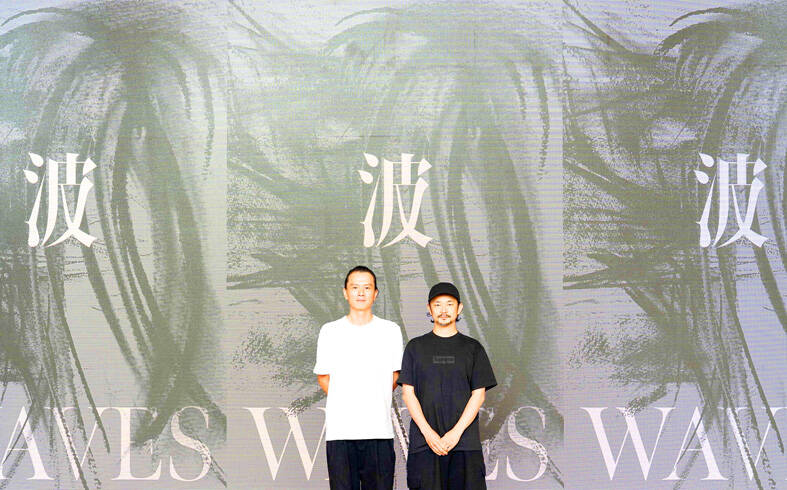Cloud Gate Dance Theatre artistic director Cheng Tsung-lung (鄭宗龍) has been working with Japanese new media artist Daito Manabe to explore the use of artificial intelligence (AI) in the dance troupe’s new work Waves (波), the choreographer said.
“The first idea about the work came at the peak of the COVID-19 pandemic. I felt that someone’s sneeze far away could affect how we live our life. Conflicts somewhere in the world could lead to food shortages in Africa,” Cheng told a news conference at the National Theater in Taipei on Monday.
These ideas made him wonder how the waves of energy created by a dancer’s performance on stage reach and resonate with the audience in an invisible process, a power he seeks to showcase in the new piece, he said.

Photo courtesy of Cloud Gate Dance Theatre via CNA
When contemplating how to create the show, Manabe — who Cheng has followed on Instagram since 2016 — came to mind, because of his augmented-reality design for Japan’s section of the closing ceremony at the Olympic Games in Rio de Janeiro, he said.
Cheng and Manabe met in Tokyo early last year, and in February, Manabe started recording data from dancers, such as their breathing, voices and the electric pulses of their muscles, the dance troupe said in a statement.
Manabe told the news conference that he is excited about working with Cloud Gate.
“My past choreography works involved fewer than 10 dancers. It [Waves] is like nothing I have worked on before because Cloud Gate has a lot more dancers,” he said.
Some Cloud Gate dancers said that some of the moves generated by AI are physically impossible to perform.
Manabe said that AI choreography is still in the early stages, but the process provides a peek into the future through trial and error.
“After all, what we have are programs and data. Our challenges are to make what is invisible visible,” Cheng said, adding that AI could spark new body movements for Cloud Gate dancers, who have been trained in martial arts and taichi.
In addition to the music and background videos, AI would be used to create a small part of Waves, Cheng said.
Waves, which Cheng created to mark Cloud Gate’s 50th anniversary, is to be staged at the National Theater in Taipei on Oct. 12-15, National Taichung Theater on Oct. 28-29 and the National Kaohsiung Center for the Arts on Nov. 4-5.
The dance troupe began its 50th anniversary celebration with a six-city tour performing founder Lin Hwai-min’s (林懷民) 1978 piece Legacy (薪傳).
The group presented the first of two free open-air performances of Cheng’s 13 Tongues (十三聲) in Taipei over the weekend, to be followed by a second show in Taichung on Saturday, and a series of workshops around Taiwan.
After wrapping up the three-city tour of Waves, Cloud Gate is to embark on a five-week European tour with 13 Tongues in France and Spain, and Cheng’s 2019 piece Lunar Halo (毛月亮) at London’s Sadler’s Wells Theatre by the end of the year, its Web site says.

A year-long renovation of Taipei’s Bangka Park (艋舺公園) began yesterday, as city workers fenced off the site and cleared out belongings left by homeless residents who had been living there. Despite protests from displaced residents, a city official defended the government’s relocation efforts, saying transitional housing has been offered. The renovation of the park in Taipei’s Wanhua District (萬華), near Longshan Temple (龍山寺), began at 9am yesterday, as about 20 homeless people packed their belongings and left after being asked to move by city personnel. Among them was a 90-year-old woman surnamed Wang (王), who last week said that she had no plans

China might accelerate its strategic actions toward Taiwan, the South China Sea and across the first island chain, after the US officially entered a military conflict with Iran, as Beijing would perceive Washington as incapable of fighting a two-front war, a military expert said yesterday. The US’ ongoing conflict with Iran is not merely an act of retaliation or a “delaying tactic,” but a strategic military campaign aimed at dismantling Tehran’s nuclear capabilities and reshaping the regional order in the Middle East, said National Defense University distinguished adjunct lecturer Holmes Liao (廖宏祥), former McDonnell Douglas Aerospace representative in Taiwan. If

TO BE APPEALED: The environment ministry said coal reduction goals had to be reached within two months, which was against the principle of legitimate expectation The Taipei High Administrative Court on Thursday ruled in favor of the Taichung Environmental Protection Bureau in its administrative litigation against the Ministry of Environment for the rescission of a NT$18 million fine (US$609,570) imposed by the bureau on the Taichung Power Plant in 2019 for alleged excess coal power generation. The bureau in November 2019 revised what it said was a “slip of the pen” in the text of the operating permit granted to the plant — which is run by Taiwan Power Co (Taipower) — in October 2017. The permit originally read: “reduce coal use by 40 percent from Jan.

‘SPEY’ REACTION: Beijing said its Eastern Theater Command ‘organized troops to monitor and guard the entire process’ of a Taiwan Strait transit China sent 74 warplanes toward Taiwan between late Thursday and early yesterday, 61 of which crossed the median line in the Taiwan Strait. It was not clear why so many planes were scrambled, said the Ministry of National Defense, which tabulated the flights. The aircraft were sent in two separate tranches, the ministry said. The Ministry of Foreign Affairs on Thursday “confirmed and welcomed” a transit by the British Royal Navy’s HMS Spey, a River-class offshore patrol vessel, through the Taiwan Strait a day earlier. The ship’s transit “once again [reaffirmed the Strait’s] status as international waters,” the foreign ministry said. “Such transits by